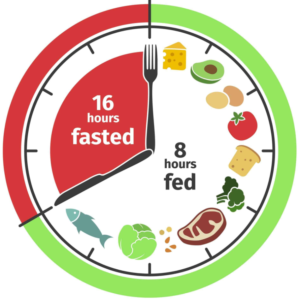Study Shows Intermittent Fasting Did Not Reduce Weight More Than Regular Eating
October 23rd, 2020
- A 12-week study compared the weight loss of two groups; 1 group fasted for 16 hours of the day, while the other group ate throughout the day without time restrictions
- The clinical trial included 141 adults, the largest randomized, controlled study for intermittent fasting
- Intermittent fasting did not statistically improve weight loss (or other body composition measurements) compared to normal eating
Intermittent fasting, also referred to as time restricted eating (TRE), has recently gained traction as an easy and effective way to lose weight. It consists of eating within a restricted time frame and fasting for several hours in between. However, most of the benefits associated with it are anecdotal, and are not based on research that involves a control arm.
Side note: The most conclusive clinical trials include design protocols with a control arm, randomization, and a large enough sample set. Unlike the majority of other fasting trials that lack these designs, this study included all of these protocols.
A randomized clinical trial conducted by a group in California was testing the effects of TRE on weight and other metabolic parameters in overweight and obese individuals. They hypothesized that those restricted to an 8-hour eating period (image below) would lose weight and improve other metabolic parameters as compared to those eating 3 meals a day without timing restrictions, also referred to as consistent meal timing (CMT).

A total of 141 participants were randomized between the two interventions (TRE or CMT) and 105 completed the entire protocol. The study lasted 12 weeks (~3 months). The TRE group was not told what or how much to eat, they were only restricted to the time of eating. Between 12:00 PM to 8:00 PM, they were allowed to eat to their desire. Then from 8:00 PM until 12:00 PM the following day, they were instructed to fast. The only thing permitted during their fasting hours were non-caloric beverages.
What the Data Showed:
In the consistent meal timing (CMT) arm, participants lost an average of 0.68Kg over the 12-week period, equivalent to 0.75% decline in body weight. In the time restricted eating (TRE) arm, participants lost an average 0.94Kg, or approximately 1.17% decline in body weight. See table below.
Comparing the difference between the two groups (0.94kg – 0.68kg = 0.26kg), the p-value was 0.63. This denotes that the difference is not a statistically significant change, and thus can be a result of chance. In simple terms, time restricted eating did not cause the drop in weight and was no different than consistent meal eating.

It was also found that there was no significant change in the body fat mass in the TRE or CMT group. There was a decrease in lean mass and total energy expenditure but no change in respiratory quotient, resting metabolic rate, fasting glucose, fasting insulin, triglycerides, LDL, HDL or total cholesterol.
In short, in this study, TRE did not statistically improve any body composition measurements.
Arguments can be made that a 12-week time period may not be adequate to see the lasting metabolic effects. A longer-term study, say 24-weeks, could be more telling on how the body will be rewired during a metabolic change. Additionally, a further limitation of this study can be that the amount of food was not restricted, only the timing was. Calories in & out is still an important feature of any diet plan.
TRE Led To Lean Mass Loss, More Than Fat Loss
It is important to mention the results found regarding lean mass. A proportion of the participants (n=50) in the California study were tested in person, while the remainder of them recorded their data using a custom app.
Of the ones that went in person, there was an average weight loss of 1.70 kg. Of this total weight, 1.10 kg was lean mass while the remaining weight was fat mass. Usually, 20-30% of weight loss is lean mass so the 1.10 kg of lean mass lost was far more than that (~65%).
It has been seen that calorie and protein intake is reduced with a TRE diet. This can be a problem for those with sarcopenia (degenerative muscle loss) or even those who are trying to maintain their muscle mass while losing weight as there is a well-defined relationship between protein intake and muscle mass.
Thus, it is important to maintain a high protein diet while intermittent fasting to avoid the loss in lean mass.
Other Studies Reached Different Conclusions
Results found in this study were inconsistent with other reports claiming that TRE is beneficial for weight loss and other metabolic parameters.
One study by Jamshed et al., found that TRE improves glucose levels as well as secondary markers like sleep and aging.
Another study showed that TRE lead to a 3% decrease in weight and also improved cardiovascular health. However, it is important to note that the sample size in this study was small (n=19) and no control group was included.
A third study showed that 4 and 6 hour TRE reduced daily intake by 550 calories and led to statistically significant weight loss (3% decline in body weight) over 8 weeks. This was a randomized, controlled study that collected data from 58 participants.
Conclusions to Make
Overall, intermittent fasting is an appealing, fuss-free weight loss alternative. It provides individuals with the freedom to eat as desired, as long as feeding is conserved to restricted hours. Based on the results in this study, there were limited changes between the TRE and CMT groups. Weight loss was not any greater in the TRE group in comparison, and insignificant changes were seen in other metabolic parameters such as fasting glucose and insulin or blood lipids and cholesterol.
This study showed that TRE did not result in substantial weight loss when compared to the CMT group. Also, although protein intake amongst participants was not directly measured in this study, the loss of lean mass seen suggests that protein levels are lowered in a TRE diet.
In the absence of other interventions such as reduced caloric intake, timing of fasting hours (early vs late) or increased levels of protein, TRE has not shown to be a more effective option of losing weight. It would be of interest to future studies to further explore the relationship between these interventions alongside TRE for weight loss.


